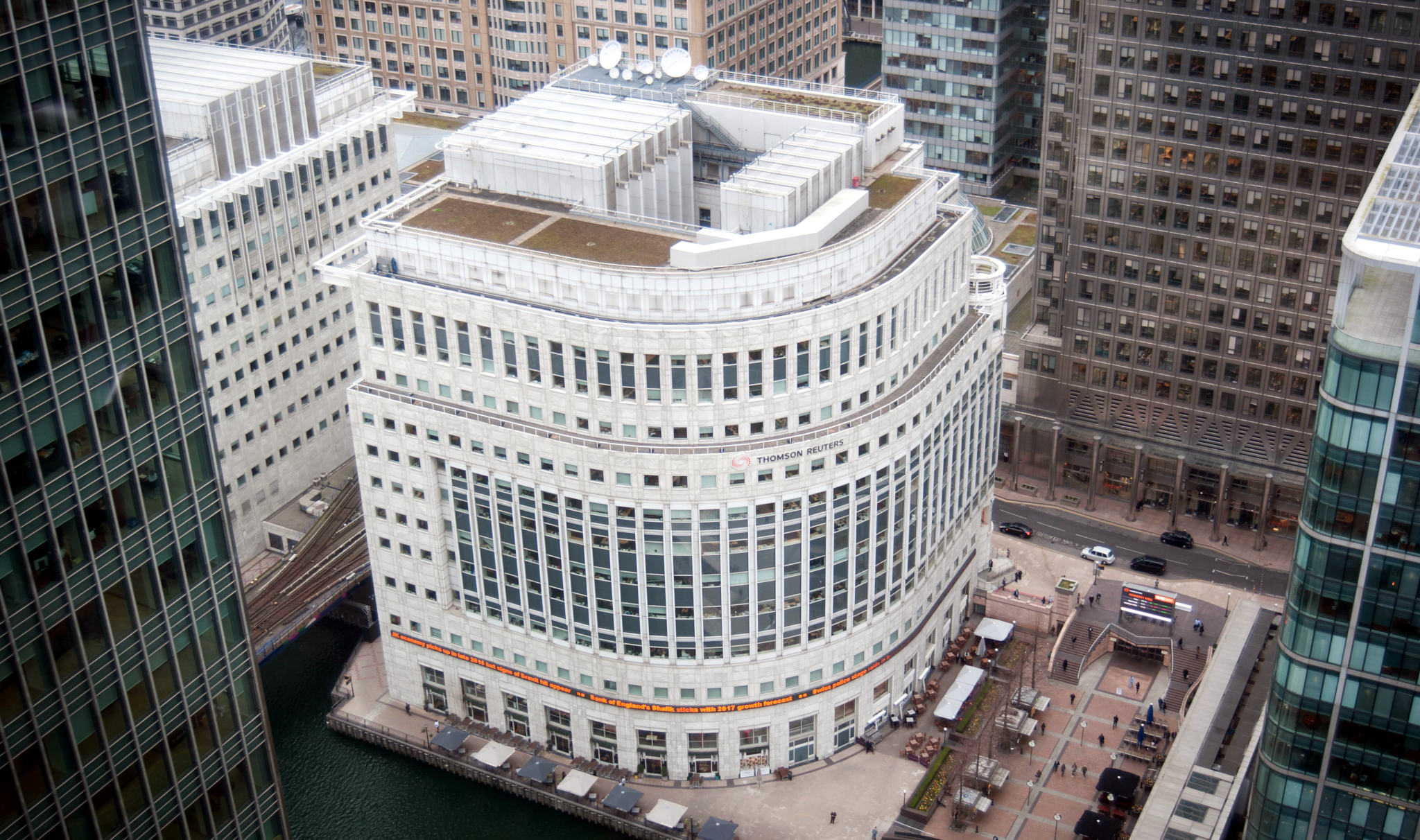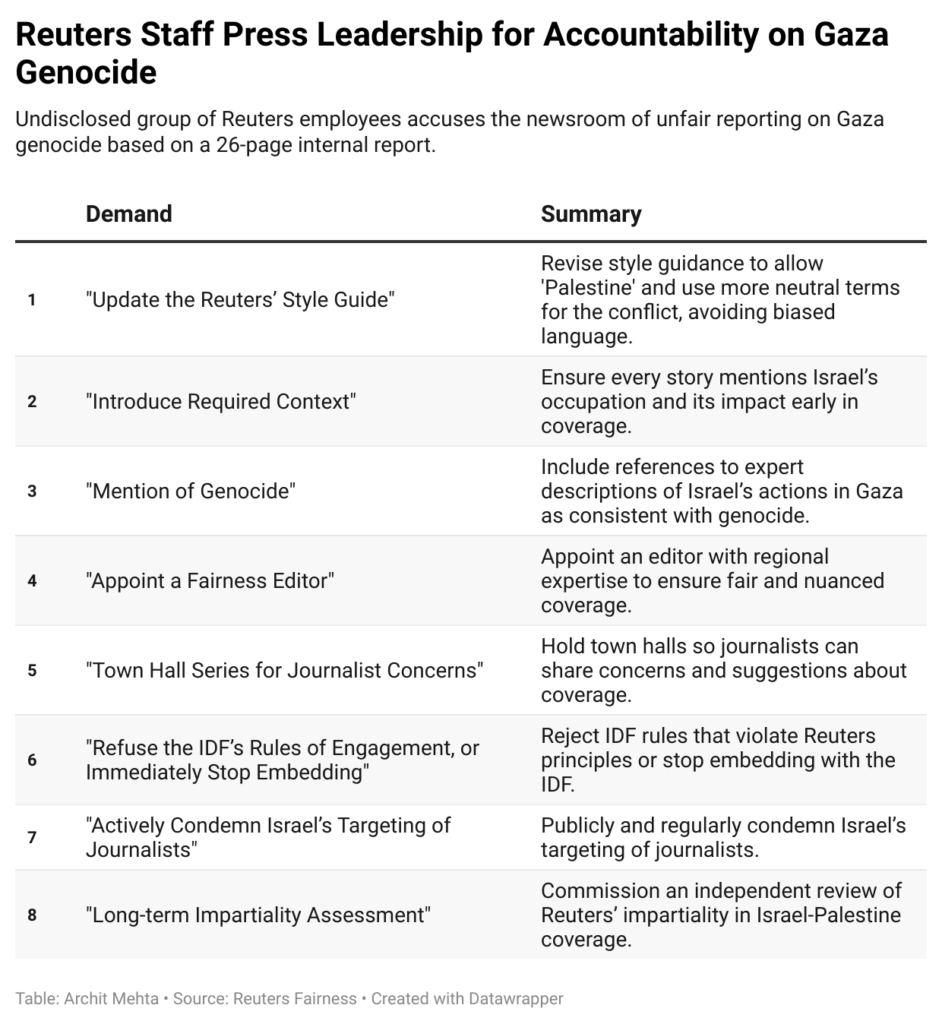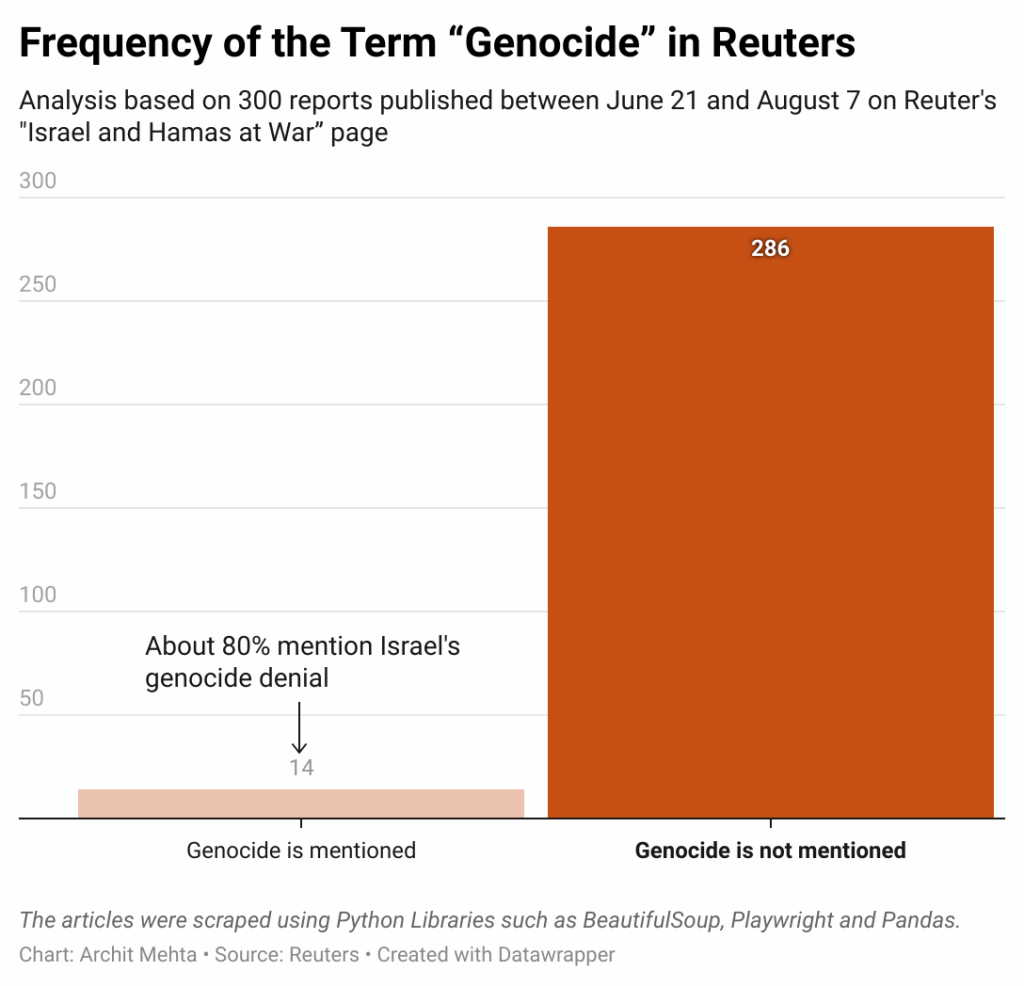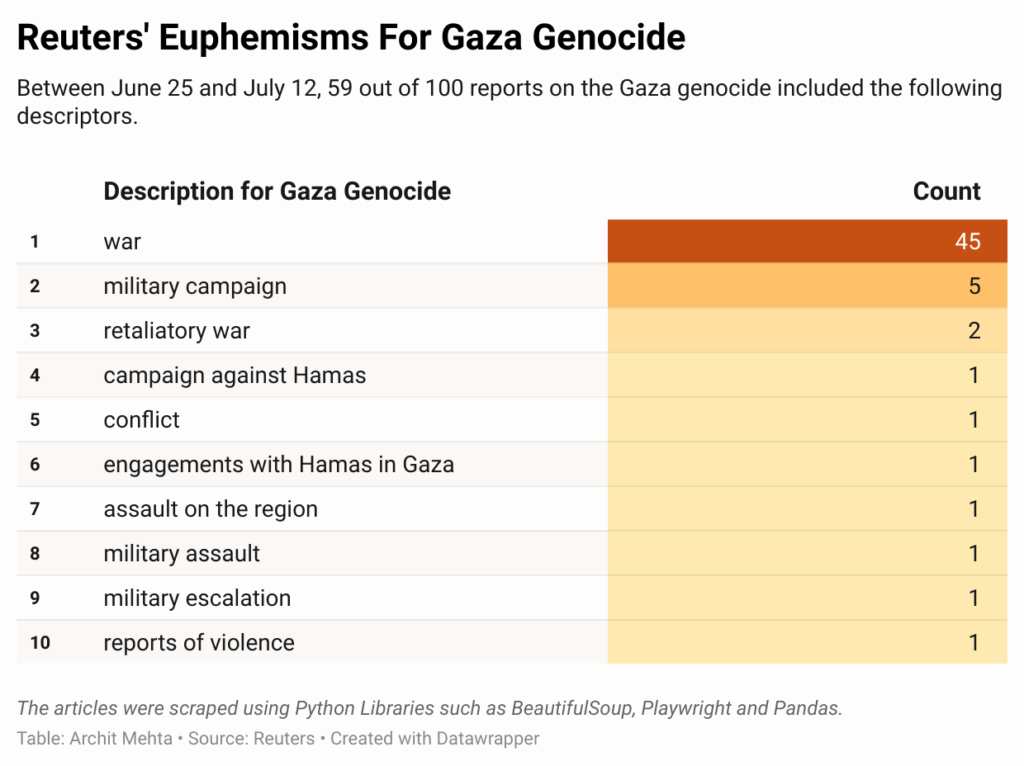Exclusive: Insiders at the world’s largest news agency reveal their battles with management over covering Palestine.

Reuters bureau in Canary Wharf, London. (Photo: Rob Wilkinson / Alamy)
When Israel assassinated Palestinian journalist Anas al-Sharif earlier this month, the Reuters news agency ran a report titled: “Israel kills Al Jazeera journalist it says was Hamas leader”.
They chose that headline despite the fact al-Sharif used to work for them – he was part of a Reuters team that won a 2024 Pulitzer Prize.
Instances like this caused a backlash online, but also sparked concern among some staff at the influential global newswire, which was founded in London in 1851 and now has a daily audience of more than a billion.
Multiple Reuters employees have spoken to Declassified about what they see as pro-Israel bias among the company’s editors and management. All requested anonymity to avoid reprisals.
Another, a desk editor, resigned around August 2024, telling colleagues in an email: “Through covering what we call the Israel-Hamas war, I’ve realized that my values don’t align with those of the company.”
In the email, they also said,“ I’ve attached a report…and an open letter some colleagues and I sent to management in the hopes that Reuters will uphold basic journalistic principles, but I now recognize that senior leadership is unlikely to change, much less stop actively stifling critiques.”
Heather Carpenter, a senior director of communications at Reuters, denied to Declassified that the company ever received this letter.
However, a Reuters source told Declassified: “A few weeks after the Oct. 7 attack, several journalists at Reuters recognized that our coverage of the Israel-Gaza war lacked objectivity.”
“In response, a group of journalists—while working full-time—undertook a comprehensive internal investigation, conducting both quantitative and qualitative analyses of our reporting.”
“The findings formed the basis of an open letter, which was shared internally to identify and connect journalists within the newsroom who are committed to strengthening Reuters’ journalism on Gaza.”
Their internal study, seen by Declassified, analysed 499 reports tagged as “Israel-Palestine” published between 7 October and 14 November 2023.
They found a “consistent pattern of assigning more resources to covering stories affecting Israelis as opposed to Palestinians.” At the time of their analysis, over 11,000 Palestinians in Gaza had reportedly been killed, around ten times the number of Israeli fatalities.
The latest death toll as per the Gaza Ministry of Health is nearly 62,000. The actual numbers are expected to be about three times higher.
They further questioned why Reuters had not reported more on claims by experts that Israel was committing genocide in Gaza, contrasting it with how the newswire approached such allegations about Russia’s conduct in Ukraine.
Its authors also complained that “one clear-cut example of how our wording implies bias is in our choice to prohibit use of ‘Palestine’…While Palestine may not be recognized as a state in some Western countries, we do not need to pretend that it is not a real place.”
Reuters management did not respond to Declassified’s questions about whether any recommendations from the internal study had been accepted.

‘Uncritical reporting’
By May this year however, there were some signs of changes to the style guide which reflected the earlier internal criticism.
Reuters global news desk’s editor for quality & style Howard S. Goller sent an email with the subject “Reuters style update on conflict in the Middle East.”
The update allows Reuters journalists to use the word “genocide” with attribution, but still limits the term Palestine for “references to historic Palestine from antiquity… to 1948” .
Even with the looser restrictions on the term “genocide”, Declassified’s analysis found that Reuters went on to use the word in just 14 of 300 reports on its “Israel and Hamas at War” page between 21 June and 7 August.

Terms such as “war,” “campaign,” “conflict,” “escalation,” and “assault” were commonly used instead.
When genocide was mentioned, it was nearly always with Israel’s denial – a practice not afforded to other belligerents such as the UAE-backed Rapid Support Forces in Sudan or Russia.
The double standard in the coverage of the Gaza genocide and other crimes against humanity has been flagged by the internal staff in the above-mentioned study.
Dr. Assal Rad, a scholar of Middle East history known as the ‘headline fixer’ on social media, told Declassified: “The pattern you note is essentially genocide denial.”
She added: “Reuters frames Israel’s atrocities in Gaza as part of an ongoing ‘war’ or ‘military campaign,’ rather than calling it a genocide, despite the consensus among human rights experts and international institutions that have concluded Israel is committing genocide.”

Goller’s email quoted sections from the style guide titled “Gaza War (2023–present)” and “Broader Context,” which provide details primarily from Israel’s perspective.
The updated sections seen by Declassified do not mention crucial details such as the role of the US and Israel in sabotaging ceasefire negotiations.
They completely omit Israel’s illegal settler colonialism and apartheid and significantly underreport the extent of destruction in Palestine.
For example, the May 27 handbook update fails to cite The Lancet’s findings: “it is not implausible to estimate that up to 186 000 or even more deaths could be attributable to the current conflict in Gaza.”
The update also neglects the fact that Gaza has become the deadliest conflict zone for journalists since the U.S. Civil War in 1861.
Last year in August, former U.N. human rights lawyer Craig Mokhiber wrote for Mondweiss: “It is simply not credible to suggest that Western media companies are not aware of the realities on the ground and of what they are doing to obscure them…
“They have indisputably made conscious choices to hide the genocide from their audiences, to systematically dehumanize the Palestinian victims, and to insulate the Israeli perpetrators from accountability.”
More recently, in May, writing for Haaretz Israeli journalist Gideon Levy said: “A courageous, decent media scene could have prevented this military operation, but we barely have anything like that.”
A Reuters spokesperson told Declassified they believed their coverage “has been fair and impartial, in keeping with the Thomson Reuters Trust Principles.
“As in many newsrooms, our coverage of the war has come under close scrutiny, including by our own journalists, and we have faced feedback from multiple places.”

